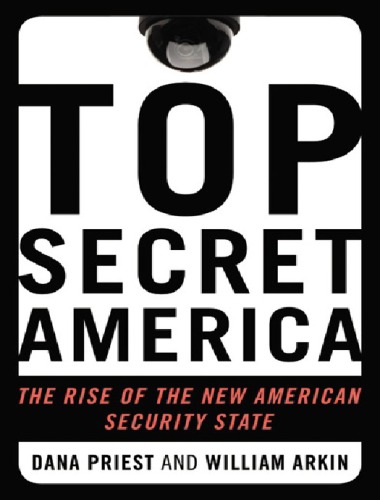
Top Secret America
The Rise of the New American Security State
کتاب های مرتبط
- اطلاعات
- نقد و بررسی
- دیدگاه کاربران
نقد و بررسی

November 7, 2011
Priest and Arkin, columnists for the Washington Post and other media outlets, won the 2010 George Polk Award for their exposé of the surveillance state. Here, they blow the whistle on how, since 9/11 and the adoption of the Patriot Act, the government and its contractors use classification and security screens to conceal expenditures that have failed to enhance national security. Volumes of information defy efforts to be processed or analyzed as layers of bureaucratic intermediaries dilute command and control. For instance, Northcom (Noradâs re-placement) has no command over other agencies while former Defense Secretary Gates refused to lead the new National Intelligence Directorate because the position had no real power. Furthermore, the authors contrast the disorganization of stateside security with methods employed by General Stanley McChrystal in Iraq and Afghanistanâwhere, for example, social networks generated cell phone user data to provide target lists for Exord special teams. Overall, this is an important book that should receive greater attention. (Sept.) Agency: Ross Youn

September 15, 2011
A newsworthy examination demonstrating that U.S. government secrecy is eroding civil liberties, busting the federal budget, contributing to deaths in unauthorized wars and spreading paranoia among large portions of the citizenry.
Washington Post reporters Priest (The Mission: Waging War and Keeping Peace with America's Military, 2003) and Arkin (Divining Victory: Airpower in the 2006 Israel-Hezbollah War, 2007, etc.) published the beginnings of this book as a newspaper series during 2010. The authors are meticulous but angry reporters, openly dismissive of the national-security apparatus begun by the federal and state governments at least 100 years ago, then expanded significantly after 9/11. Although President Obama vowed to curtail the national-security state and overall government secrecy in the wake of the Bush administration, Priest and Arkin demonstrate that the current president has abandoned that vow. They calculate that at least 850,000 individuals inside government and within government contractors have received "top secret" security clearances. Untold hundreds of thousands more individuals are cleared to use and abuse secret but not top-secret information. Priest and Arkin reach the sad but unavoidable conclusion that 9/11, combined with other real and threatened incursions by terrorists, has led to an around-the-clock police state. In addition to compelling anecdotes, the authors cite as examples the regular broadcasts of threat warning levels from the Department of Homeland Security, a culture of fear surrounding discussions of al-Qaeda by politicians and the public and budget-busting measures to protect what is unprotectable or perhaps not even in danger.
A mixture of investigative reporting and advocacy journalism that shines light in dark corners but is ultimately depressing because the authors seem convinced that the paranoia and its dangerous offshoots will never dissipate.
(COPYRIGHT (2011) KIRKUS REVIEWS/NIELSEN BUSINESS MEDIA, INC. ALL RIGHTS RESERVED.)

April 15, 2011
"The government has built a national security and intelligence system so big, so complex and so hard to manage, no one really knows if it's fulfilling its most important purpose: keeping its citizens safe." As stated on the website of the Washington Post, that's the thrust of this book, derived from a series that the Post published. Two years in the making, the series was written by multiple Pulitzer Prize winner Priest and Arkin, who has reported on national security for more than three decades. Appearing in July 2010, the series has so far received 11 million hits. Essential.
Copyright 2011 Library Journal, LLC Used with permission.

























دیدگاه کاربران